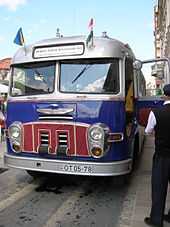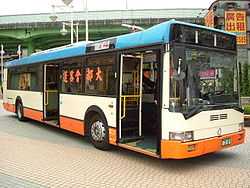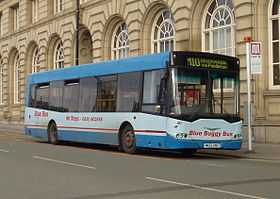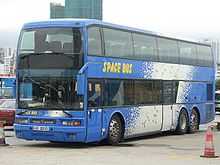Ikarus Bus
|
| |
| Private company | |
| Industry | Bus manufacturing |
| Founded | 1895 |
| Headquarters | Budapest, Hungary |
Key people | Gábor Széles — Chairman |
| Products | Buses |
| Revenue | Unknown |
Number of employees | Unknown |
| Slogan | Unknown |

Ikarus is a bus manufacturer based in Budapest, Hungary. It was established in 1895 as Uhri Imre Kovács- és Kocsigyártó Üzeme (roughly: "Imre Uhri's Blacksmith Workshop and Coach Factory").
History
By 1913, the company focused mainly on constructing cars and due to increased sales during World War I it made great profits. In 1927, Ikarus had won an international tender and it was this year that large scale production could begin by delivering 60 shuttle buses. Following the Wall Street Crash the company became bankrupt as it did not receive any significant orders and it had to be closed down. In 1935 the company had resumed production and was fully functioning during World War II. On 23 February 1949, Ikarus was officially established when it merged with airplane manufacturer Ikarus Gép és Fémgyár Rt.
In 1955 and 1956 with the new front engine models (Ikarus 620, 630 and 31) the company's foreign sales were boosted and apart from Eastern-European countries, China, Burma and Egypt started using them in several of their cities. By 1962, Ikarus delivered 8,000 buses abroad and in 1970 it won second place at an expo in Monaco showing its prominence in Europe. In 1971, over 100,000 buses were manufactured and sales increased year-by-year. By 1973, Ikarus became the world's fourth largest manufacturer, but lacking raw materials, orders were not delivered in time on several occasions. Until the dissolution of the Soviet Union, the German Democratic Republic was one of the most important trading partners of Ikarus, but when Germany was re-unified sales fell to about 10%.
Ikarus provided body shells (without doors, windows, seats, engine) for Orion Bus Industries contracts to supply Toronto and Ottawa transit systems with articulated buses in late 1986-1987. The Orion Ikarus buses were put on the fast track for retirement by the TTC due to structural corrosion problems. These problems were blamed on poor spot welds made during the manufacture of the bus.[1]
From 1999, the company was owned by Irisbus, a French-Italian investing group. In 2006, Irisbus sold Ikarus Bus to Hungary's Műszertechnika group for the full asking price. Műszertechnika signed a contract back in December to acquire 100% of the company, which was established back in 1999 as a 75:25 joint venture between Renault-Iveco and Hungarian Industrialist Gábor Széles for Ikarus. In 2002, Ikarus placed the Natural Gas (CNG) 18 meter articulated bus in Colombia, which is currently in operation in Transmilenio Rapid Bus Mass Transit System in the Capital City of Bogota. The company has come out in 2007 with a new low-floor model which they plan to produce in Hungary (200-400 per year), Russia (1000-2000 per year) and China (10,000 per year).
In 2006, Gary Urteaga, a business entrepreneur from Peru, initiated a project with Ikarus to penetrate the Latin American Market. The Project involves the supply of Natural Gas (CNG) Buses of 8 meters, 12 meters and articulated 18 meters together with the investment in Bus Assembly Plants for the Latin American region. Offers have been made to bidders of the Metropolitano Rapid Bus Transit System of the City of Lima in Peru which is to awarded in 2007 and implemented in 2008-2009. Also, the government of Venezuela has initiated dialogue with Ikarus derived from the strong interest in the market for Natural Gas Buses shown by Venezuelan President Hugo Chavez Frias.
In 2010 a new Ikarus V187 and other standard and articulated models were announced to the press and publicly tested on BKV lines
As of 2010, a second bus factory is planned to be built in the United States, with new headquarters in Los Angeles. A third bus factory is also planned in Eskişehir, Turkey.
In 2014 the Hungarian city of Szeged started operating new Ikarus-Skoda trolley busses. The busses are produced in Székesfehérvár, the engines in the Czech republic.
Models
| Model | Engine | Type | Length | Notes | Image |
|---|---|---|---|---|---|
| 30 | front |  | |||
| 31 | front | 8.5 m | | ||
| 55 | rear | coach | 11.4 m | | |
| 60 | front | 9.4 m | |||
| 66 | rear | city/suburban | 11.4 m | | |
| 180 | mid | articulated city | 16.5 m | extended version of the Ikarus 556 |  |
| 190 | rear | 11 m | like West German standard; 1973–1983 | ||
| 194 | mid | city/suburban | on Volvo B10M chassis | ||
| 196 | mid | city/suburban | on Volvo B10M chassis | ||
| 196.02 | mid | articulated | 18 m | on Volvo chassis | |
| 196.03 | rear | articulated | on Scania chassis, 1984 | ||
| 208 | rear | suburban | 8.5 m | ||
| 210 | rear | coach | |||
| 210 | rear | suburban | |||
| 211 | rear | midi bus/coach |  | ||
| 212 | rear | midi bus/coach | |||
| 216 | rear | midi bus/coach | |||
| 220 | rear | suburban | 9.5 m | no series production | |
| 230 | rear | coach | |||
| 240 | rear | city/suburban | |||
| 242 | rear | city/suburban | 11 m | ||
| 246 | rear | city/suburban | |||
| 250 | rear | coach | 12 m | produced in large numbers |  |
| 252 | rear | coach | 11 m |  | |
| 255 | rear | interurban | 11 m |  | |
| 256 | rear | coach | 11 m |  | |
| 260 | mid | city | 11 m |  | |
| 260T | mid | trolleybus | 11 m | ||
| 261 | mid | city | 11 m | Right-Hand Drive | |
| 263 | mid | city | 12 m | Upgraded, 12 m version of model 260 |  |
| 266 | rear | city/suburban | 11 m |  | |
| 280 | mid | articulated | 16.5 m |  | |
| 280E | articulated trolleybus |  | |||
| 280T | mid | articulated trolleybus |  | ||
| 281 | mid | articulated | 16.5 m | Right-Hand Drive | |
| 282 | mid | articulated | 18 m | ||
| 283 | mid | articulated | 18 m |  | |
| 284 | rear | articulated | 17.9 m | ||
| 286 | mid | articulated | 18.2 m | 2.59 m wide for USA; see Crown-Ikarus 286 | |
| 290 | front | airport | 14 m | ||
| 293 | mid | double articulated | prototype | ||
| 303 | rear | coach | 8.7 m | only 9 prototypes built | |
| 311 | front | 8.5 m | 1957–1972 | ||
| 380NE | rear | coach | 12 m | only 1 prototype built | |
| 410NE | rear | city | 11.4 m | only prototypes built | |
| 440NE | rear | city | 11 m | only 1 prototype built | |
| 553 | front | minibus | | ||
| 556 | mid | city | 10.9 m |  | |
| 620 | front | city | 9.4 m | ||
| 630 | front | interurban | 9.4 m |  | |
| 695 | mid | articulated | 17.9 m | "PALT" apron bus | |
Modern types
| Model | Type | Length | Notes | Image |
|---|---|---|---|---|
| 405 | city bus | 7 m |  | |
| 411 | low-floor city bus | 11 m |  | |
| 412 | low-floor city bus | 11.9 m |  | |
| 412T | trolleybus |  | ||
| 415 | city bus | 11.4 m |  | |
| 415T | trolleybus |  | ||
| 417 | low-floor articulated city bus | 17.6 m | only 30 ever produced |  |
| 435 | articulated city bus | 17.8 m |  | |
| 438 | articulated bus | only 1 prototype built | ||
| 480 | city bus | 12 m |  | |
| 481 | low-floor city bus | 12 m |  | |
| 489 | low-floor city bus | 12 m | Polaris |  |
| EAG E91 | mini city bus | 7.8 m |  | |
| EAG E92 | city bus | 9 m | only 1 prototype built | |
| EAG E94 | urban bus 12 m | | ||
| EAG E94G | articulated urban/suburban bus | 18 m | only a few built | |
| EAG E95 | interurban bus | 12. m | | |
| EAG E97 | highdecker coach | 12.0 m | ||
| EAG E98 | coach | 12.0 m | ||
| EAG E99 | double-deck coach | 12.m |  | |
| E127 / 127E | low-floor suburban bus | 12.725 m | .jpg) | |
| E134 / 134E | low-floor suburban bus | 13.4 m | ||
| V134 / 134V | low floor city bus | 13.4 m | ||
| V187 / 187V | low-floor articulated city bus | 18.75 m | pre-production |  |
See also
- Crown-Ikarus 286
- Orion Bus Industries
- North American Bus Industries
References
External links
| Wikimedia Commons has media related to Ikarus (bus manufacturer). |
- Article about "Ikarus Bus and Coaches" from busexplorer website
- Polish page about Ikarus and Man buses
- Hungarian website featuring many Ikarus buses
- Ikarus in Czech Republic (in Czech)
- Technical description of Ikarus buses (in Ukrain)
| ||||||||||||||
| ||||||||||||||||||||||||||||||